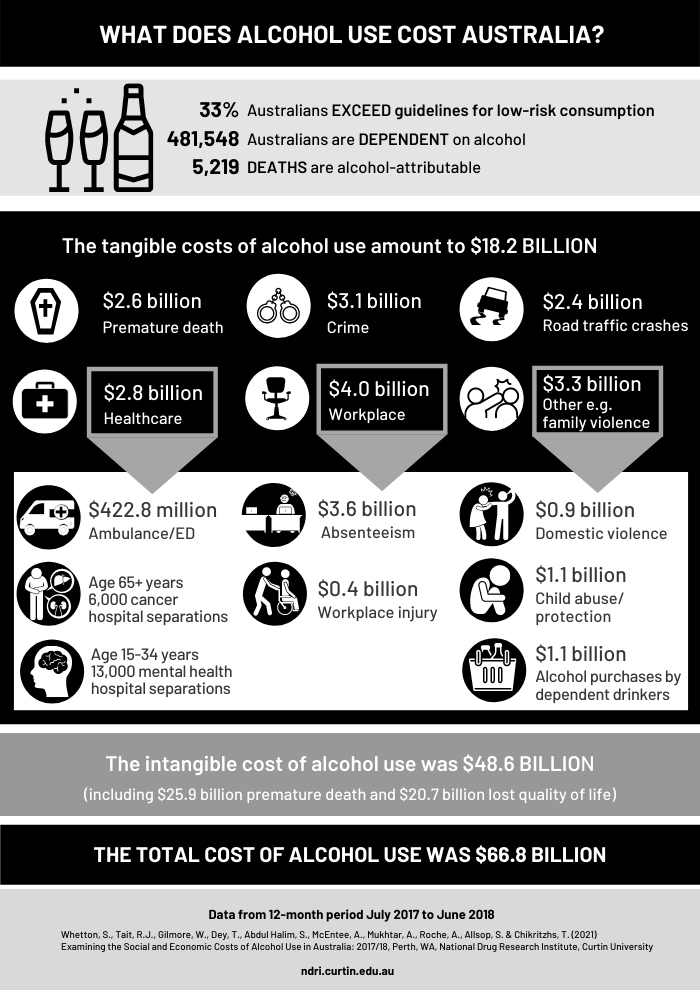Media release: The $67 billion cost of one of our favourite drugs
While many Australians enjoy pleasures associated with drinking alcohol, we need to treat it with more caution, with alcohol consumption conservatively estimated to cost the Australian community $66.8 billion a year in health, workplace and other costs, according to research released today. This dollar figure covers some significant personal and community level harms.
Examining the Social and Economic Costs of Alcohol Use in Australia: 2017/18, published by the National Drug Research Institute (NDRI) at Curtin University in Perth, is the first national update in a decade of the costs of alcohol use. Using up-to-date methods of calculating costs and including a number of previously uncounted conditions and costs, it is substantially higher than the 2010 estimate of $14.4 billion. The main estimate includes some reference to ‘protective’ effects from alcohol, consistent with the evidence. A conservative estimate was made in our calculation of costs, as further harms where a reliable cost could not be estimated were excluded.
The research behind the updated national estimate was funded by the Australian Government Department of Health, and found that in the 2017-2018 financial year:
- alcohol was responsible for $18.2 billion in tangible costs including from: ill health; health service costs such as emergency department and hospital admissions; worker absence and occupational injuries; crime; road traffic crashes; and, alcohol purchases by those dependent on alcohol (but not by other alcohol consumers);
- alcohol was responsible for another $48.6 billion in intangible costs, which is the value of items that can’t be bought or sold, such as years of life lost from premature death, lost quality of life from living with alcohol dependence or from child abuse, and, impacts on victims of alcohol-caused crime; and,
- not included in the overall total were costs such as those associated with Fetal Alcohol Spectrum Disorder ($16 billion). There is a clear need for evidence about the prevalence of FASD to allow an accurate estimate of cost and to inform preventive and other responses.
There were several other critical areas where, due to limited data, reliable cost estimates were difficult to determine including: lost quality of life from living with someone with alcohol dependence; and, reduced workplace productivity (‘presenteeism’). Although not included in the overall total, indicative estimates suggested that these outcomes were highly likely to attract substantial costs.
Led by NDRI, the national research team also included experts from the South Australian Centre for Economic Studies at the University of Adelaide, and the National Centre for Education and Training on Addiction at Flinders University, South Australia.
NDRI’s Professor Tanya Chikritzhs explained that factors contributing to the increase in the updated estimate included research establishing new links between alcohol consumption and diseases, advances in research methods allowing more costs to be quantified, higher costs of medical care, and a growing and ageing population.
“These offset some of the health gains we might expect from overall declining use of alcohol in Australia,” Professor Chikritzhs said. “In addition, some of the harms, such as cancers, can take time to appear, so we are seeing the impacts of alcohol from years and perhaps decades of use.”
NDRI Professor Steve Allsop said that while the amount of alcohol consumed had declined substantially from a peak in the mid-1970s, particularly in younger adults, this research showed the need for continued investment in public health strategies to reduce harms from alcohol, not just for those who drink but for those affected by the drinking of others.
“Alcohol continues to cause a significant toll through premature deaths, with 5,219 cases attributed to alcohol in 2017/18, personal suffering, reduced quality of life, and real financial costs in Australia,” Professor Allsop said.
“Nearly half-a-million Australians are dependent on alcohol, with many more drinking in a way that puts their health at risk. Importantly, any member of the community can be impacted by the drinking of others. The many adverse health effects and other consequences result in significant costs to society. Effective strategies to address alcohol related harms have the potential to substantially reduce medical costs, improve productivity, diminish crime, and lower costs to the whole community while improving community and individual wellbeing.”
Further Information:
The research report Examining the Social and Economic Costs of Alcohol Use in Australia: 2017/18 is available here and an infographic summary of the key findings is available below.
Media spokespeople:
Professor Steve Allsop, National Drug Research Institute, Curtin University, Perth
Mobile: 0407 967 964
Email: s.allsop@curtin.edu.au
Professor Tanya Chikritzhs, National Drug Research Institute, Curtin University
Mobile: 0418 807 378
Email: T.N.Chikritzhs@curtin.edu.au
Steve Whetton, South Australian Centre for Economic Studies, University of Adelaide
(Economic questions)
Mobile: 0432 350 232
Email: steve.whetton@adelaide.edu.au
Professor Ann Roche/Dr Alice McEntee, National Centre for Education & Training on Addiction, Flinders University
(Workplace questions)
Mobile: 0421 140 983
Email: ann.roche@flinders.edu.au
Media relations
Vic Rechichi, National Drug Research Institute, Curtin University, Perth
Mobile: 0414 682 055
Email: ndri@curtin.edu.au
David Ellis, SA Centre for Economic Studies, University of Adelaide, Adelaide
Mobile: 0421 612 762
Email: david.ellis@adelaide.edu.au
For further perspectives on the impact of alcohol the following contacts are suggested:
Carol Daws, CEO, Cyrenian House, Alcohol and other drug treatment service
(Treatment services)
Mobile: 0408 937 639
Email: carol@cyrenianhouse.com
NDRI Adjunct Professor Diana Egerton-Warburton, Monash University
(Emergency Departments)
Mobile: 0410 427 925
Email: Diana.Egerton-Warburton@monash.edu
Dr Erin Lalor, CEO, Alcohol and Drug Foundation
(Impact of alcohol on communities)
Mobile: 0418 955 996
Email: Erin.Lalor@adf.org.au
NDRI Adjunct Professor Terry Slevin, CEO, Public Health Association of Australia
(Public Health)
Mobile: 0419 901 599
Email: tslevin@phaa.net.au
Julia Stafford, Cancer Council Alcohol Working Group Chair, Cancer Council WA
(Alcohol and cancer)
Mobile: 0413 531 398
Email: Julia.Stafford@cancerwa.asn.au
Infographic:

Posted on: 16 Dec 2021
news list